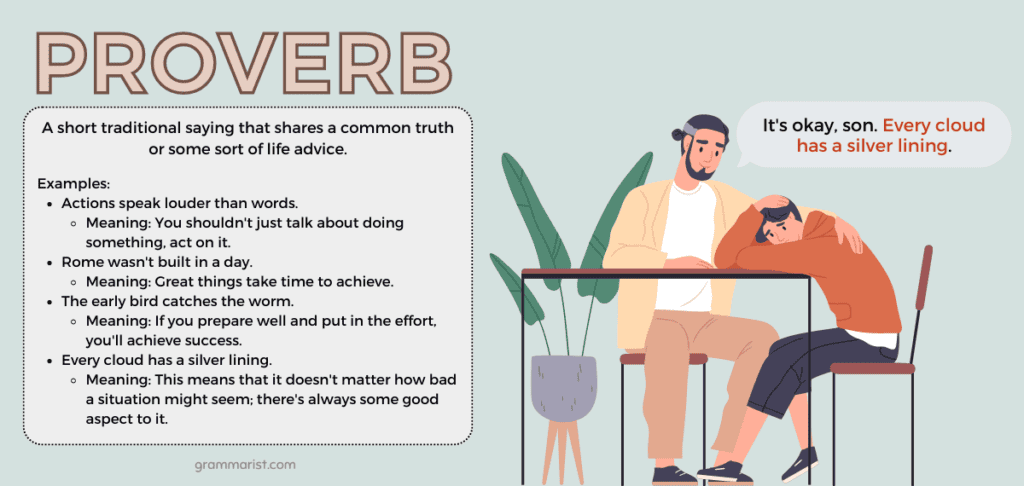Proverbs like a stitch in time saves nine or don’t count your chickens before they’re hatched play a crucial role in English language and even our culture. Let’s grab the bull by the horns and plunge straight into this intriguing aspect of language we call proverbs! (Hint… that was another proverb!)
What Is a Proverb?
A proverb is a short, popular saying expressing some truth or piece of advice or even a hard life lesson. They’re linguistic gems that have been polished by centuries of use and are treasured across all cultures. Think of them as the social glue that binds generations, connecting the wisdom of the past with the experiences of the present.
I’m no proverb expert, but growing up in rural Newfoundland with grandparents who were immigrants from all over Europe and the UK, I’ve heard my fair share of proverbs. I’ll share a few of them with you below!
Famous Proverbs vs. Common Idioms: Key Differences
They’re easy to mix up because they’re so similar. But there’s a trick to remember the difference.
A proverb is a short, traditional saying that shares a common truth or some sort of life advice. They’re usually passed down through generations and are widely recognized in the culture or society where they came from. The messages conveyed by proverbs are usually universal and super relatable.
But an idiom is a phrase or expression with a figurative or non-literal meaning, and its meanings aren’t always predictable from the definitions of its individual words.
What Are the 5 Uses of Proverbs?
Proverbs have so many uses, but the most common ones are:
- Imparting wisdom: Proverbs carry the wisdom of ages, helping us navigate life’s many challenges.
- Expressing common truths: They state universal truths in a succinct, relatable way.
- Teaching lessons: Proverbs often serve as cautionary tales or lessons, helping guide behavior.
- Adding spice to language: They make our conversations more colorful and impactful.
- Cultural expressions: Proverbs give insights into a culture’s beliefs, values and history.
Popular Proverbs in English
These examples of proverbs are just a few of the many found in the English language.
- A bird in the hand is worth two in the bush: Better to have a lesser but certain advantage than the possibility of a greater one that may come to nothing.
- Every cloud has a silver lining: This means that it doesn’t matter how bad a situation might seem; there’s always some good aspect to it.
- Don’t put all your eggs in one basket: Do not risk all your resources in one venture.
- The early bird catches the worm: If you prepare well and put in the effort, you’ll achieve success.
- You can’t judge a book by its cover: It’s not wise to form opinions based solely on appearance.
- Actions speak louder than words: You shouldn’t just talk about doing something; act on it.
- The grass is always greener on the other side: People often want what they do not have.
- Don’t cry over spilled milk: There’s no use being upset over situations that have already happened and cannot be changed.
- Rome wasn’t built in a day: Great things take time to achieve.
- When in Rome, do as the Romans do: When you visit a foreign place, be sure to follow the customs of those living there.
Proverb Examples From Other Languages
There are numerous proverbs from other languages that have found a home in English:
- C’est la vie (French): That’s life; such is life.
- Carpe diem (Latin): Seize the day; enjoy the present.
- Que sera, sera (Spanish): What will be, will be.
- Caveat emptor (Latin): The buyer needs to check the quality of goods before purchasing.
- In vino veritas (Latin): In wine, there is truth, which means that most people speak the truth when they are drunk.
Using Proverbs in Sentences
Here are ten examples of how to use proverbs in sentences:
- A bird in the hand is worth two in the bush, so let’s not gamble on the deal.
- Even though it rained on our family vacation, every cloud had a silver lining because we enjoyed some quiet indoor activities together.
- Don’t put all your eggs in one basket; diversify your investment portfolio.
- He always wakes up early to work out because he knows that the early bird catches the worm.
- She looks quiet, but you can’t judge a book by its cover; she’s actually quite outgoing.
- Well, c’est la vie; you can’t control everything that happens to you.
- As he sipped his wine, he muttered, “In vino veritas,” and started sharing his deepest secrets.
- “Carpe diem!” she declared before jumping off the cliff into the sea.
- “Que sera, sera,” he said, shrugging off his worries about the future.
- Remember, caveat emptor, always read the reviews before you buy something online.
Embracing the Wisdom of Proverbs
Proverbs are truly the pearls of wisdom, a testament to the shared experiences of humanity. So, the next time you’re about to bite the bullet or break the ice, remember you’re invoking a time-honored tradition that connects us all. Keep exploring these nuggets of wisdom, for as the African proverb says, “Wisdom is like a baobab tree; no one individual can embrace it.”
More Proverbs
A
- Action Speak Louder Than Words – Meaning & Examples
- All good things must come to an end
- All Roads Lead to Rome – Origin & Meaning
- All’s fair in love and war
- All’s Well That Ends Well – Meaning & Expansion of Idea
- An Englishman’s home is his castle.
- An eye for an eye and a tooth for a tooth
- An ounce of prevention is worth a pound of cure
- Apple Doesn’t Fall Far From The Tree – Origin & Meaning
- Ask me no questions and I’ll tell you no lies
- A bird in the hand is worth two in the bush
- A fool and his money are soon parted
- A Friend In Need Is A Friend Indeed – Origin and Meaning
- A leopard can’t change its spots
- A man is known by the company he keeps
- A penny saved is a penny earned
- A picture is worth a thousand words
- A rolling stone gathers no moss
- A stitch in time saves nine
B
D
F
G
H
I
N
O
P
S
T
- The end justifies the means
- The Game is Afoot – Meaning, Origin and Usage
- The pen is mightier than the sword
- The Road to Hell Is Paved with Good Intentions – Origin & Meaning
- The squeaky wheel gets the grease
- The Straw That Broke The Camel’s Back – Series Of Unpleasant Events
- Time heals all wounds
- Time waits for no man
- Too many cooks spoil the broth
- To err is human; to forgive, divine
- To the victor belong the spoils
- Two Wrongs Don’t Make a Right – Proverb, Meaning & Examples
- Two’s company, three’s a crowd


